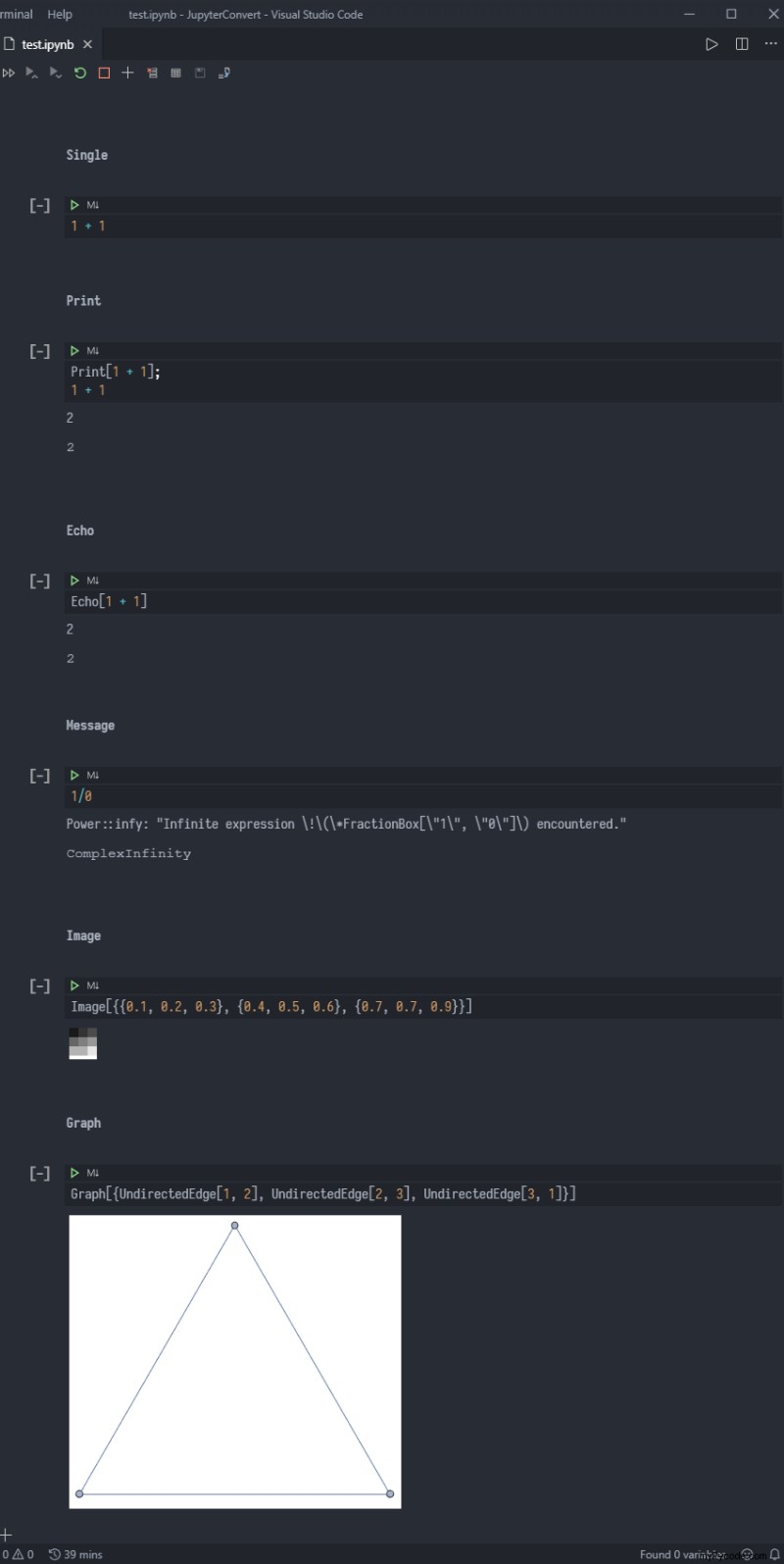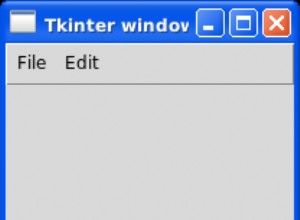Le point principal est que Jupyter est une structure plate, mais le Notebook est une structure imbriquée. Il m'a fallu beaucoup de temps pour résoudre complètement ce problème.
Merci pour les conseils de @b3m2a1, les problèmes de texte ont été réduits.
Maintenant, il y a encore un problème :
- Le rendu de l'image a des bords incompréhensibles
- Plus de problèmes introuvables, placez les fichiers de test sur GalAster/JupyterConvert si vous en trouvez.
Le fichier de test peut être téléchargé à partir de :Test/Notebook2Jupyter/code.nb

(* ::Package:: *)
Notebook2Jupyter::usage = "";
Begin["`Private`"];
JupyterInputCell::usage = "";
JupyterCodeCell::usage = "";
JupyterMarkdownCell::usage = "";
JupyterRawCell::usage = "";
Options[Notebook2Jupyter] = {};
Notebook2Jupyter[nb_NotebookObject, o : OptionsPattern[]] := Block[
{jp = $JupyterTemplate, parsed, cells},
parsed = Flatten[parseCell /@ Cells[nb]];
cells = SequenceSplit[parsed, {
{text__JupyterMarkdownCell} :> JupyterMarkdownBuild[First /@ {text}],
{in_JupyterInputCell, other___JupyterCodeCell} :> JupyterCodeBuild[First /@ {in, other}]
}];
jp["cells"] = cells;
[email protected];
];
Notebook2Jupyter[nb_NotebookObject, path_String, o : OptionsPattern[]] := Block[
{jp = Notebook2Jupyter[nb, o]},
[email protected][path, jp, "JSON"]
];
JupyterMarkdownBuild[text_List] := <|
"cell_type" -> "markdown",
"source" -> StringRiffle[text, "\n\n"]
|>;
JupyterCodeBuild[{code_}] := <|
"cell_type" -> "code",
"source" -> code
|>;
JupyterCodeBuild[{code_, out_}] := <|
"cell_type" -> "code",
"source" -> code,
"outputs" -> {
<|
"output_type" -> "execute_result",
"data" -> out
|>
}
|>;
JupyterCodeBuild[{code_, print__, out_}] := <|
"cell_type" -> "code",
"source" -> code,
"outputs" -> [email protected]{
<|"name" -> "stdout", "output_type" -> "stream", "text" -> #|>& /@ {print},
<|
"output_type" -> "execute_result",
"data" -> out
|>
}
|>;
(* ::Chapter:: *)
(*Cell*)
(* ::Section:: *)
(*Template*)
$JupyterTemplate = <|
"metadata" -> <||>
|>;
(* ::Section:: *)
(*Default*)
parseCell[co_CellObject] := parseCell[NotebookRead[co], co];
parseCell[c_Cell, co_CellObject] := parseCell[#2, #, co]& @@ c;
parseCell[s_, o___] := (
Echo[Inactive[parseCell][s, o], "Todo: "];
[email protected]["[//]: # (No rules defined for ``)\n\n", {s}]
);
(* ::Section:: *)
(*Normal*)
parseCell["Title", data_, co_CellObject] := JupyterMarkdownCell["# " <> [email protected]];
parseCell["Subtitle", data_, co_CellObject] := JupyterMarkdownCell["## " <> [email protected]];
parseCell["Chapter", data_, co_CellObject] := JupyterMarkdownCell["### " <> [email protected]];
parseCell["Section", data_, co_CellObject] := JupyterMarkdownCell["#### " <> [email protected]];
parseCell["Subsection", data_, co_CellObject] := JupyterMarkdownCell["##### " <> [email protected]];
parseCell["Subsubsection", data_, co_CellObject] := JupyterMarkdownCell["###### " <> [email protected]];
parseCell["Text", data_, co_CellObject] := JupyterMarkdownCell[[email protected]];
parseCell["WolframAlphaShort", data_String, co_CellObject] := JupyterMarkdownCell[data];
(* ::Section:: *)
(*Code*)
toASCII[a_] := StringTake[ToString[a, InputForm, CharacterEncoding -> "ASCII"], {10, -2}];
parseCell["Input", boxes_, co_CellObject] := Block[
{expr = MakeExpression[[email protected], StandardForm], out},
out = expr //. {
HoldComplete[ExpressionCell[{a___, Null, b___}]] :> StringJoin[toASCII[[email protected]], ";\n", toASCII[[email protected]]],
HoldComplete[ExpressionCell[a_]] :> toASCII[[email protected]]
};
JupyterInputCell[out]
];
parseCell["Print", boxes_, o___] := JupyterCodeCell[[email protected]`CallFrontEnd[ExportPacket[[email protected], "PlainText"]]];
parseCell["Echo", data___] := parseCell["Print", data];
parseCell["Message", data___] := parseCell["Print", data];
parseCell["Output", boxes_, co_CellObject] := Block[
{dump = [email protected]`CallFrontEnd[ExportPacket[[email protected], "PlainText"]]},
[email protected][
dump == "",
<|"image/png" -> ExportString[Rasterize[co, Background -> None], {"Base64", "PNG"}, Background -> None]|>,
<|"text/plain" -> dump|>
]
];
(* ::Section:: *)
(*TeX*)
boxesToTeX = ToString[[email protected]#, TeXForm] &;
parseCell["Output", BoxData[FormBox[boxes_, TraditionalForm]], cellObj_CellObject] := TemplateApply["$$``$$\n\n", {[email protected]}];
(* ::Section:: *)
(*Pass*)
parseCell["Code", data___] := {};
parseCell[$Failed, data___] := {};
(* ::Chapter:: *)
(*Data*)
parseData[list_List] := parseData /@ list;
parseData[string_String] := string;
parseData[cell_Cell] := [email protected]@cell;
parseData[boxes_] := (
Echo[Inactive[parseData][boxes], "Todo: "];
[email protected]@boxes
);
parseData[data_BoxData] := List @@ (parseData /@ data);
parseData[data_TextData] := List @@ (parseData /@ data);
parseData[TemplateBox[{text_String, link_String}, "HyperlinkURL"]] := TemplateApply["[``](``)", {text, link}];
End[]
Ce nb2ipynb La fonction prend le nom de fichier du bloc-notes en entrée et renvoie un bloc-notes jupyter compatible avec JWLS.
nb2ipynb = Module[{
cellF = {
"cell_type" -> "code",
"execution_count" -> 1,
"metadata" -> <||>,
"outputs" -> {<|"name" -> "stdout",
"output_type" -> "stream",
"text" -> StringRiffle[ToString /@ {##2}, "\n"]|>},
"source" -> ToString /@ List @@ HoldForm /@ (#1/.Null -> "\n\n")
}&,
ipynbF = {
"cells" -> cellF @@@ #,
"metadata" -> {"kernelspec" -> {"display_name" -> "JWLS_2",
"language" -> "text",
"name" -> "jwls_2"},
"language_info" -> {"codemirror_mode" -> "mathematica",
"file_extension" -> ".wl",
"mimetype" -> "text/x-mathematica",
"name" -> "WolframScript"}},
"nbformat" -> 4,
"nbformat_minor" -> 2
}&,
nb = NotebookImport[# _,"FlattenCellGroups" -> False]~
DeleteCases~ HoldComplete[Null]},
Export[[email protected]#<>".ipynb", [email protected], "JSON"]
]&
Je ne l'ai pas essayé avec le noyau WRI officiel mais je suppose que vous avez simplement besoin de modifier le metadata champ.


